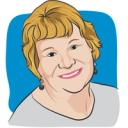
There are times in our cancer journey – and in life – when we want to “freeze time.” I am only in temporary remission, and eventually will have to go back on chemo again. This time it will likely be a new one with unknown consequences.

Jane Biehl is a 12-year survivor of a very rare form of blood cancer, known as myelodysplastic syndrome (MDS). She has enjoyed several exciting careers including a librarian, counselor, teacher, and writer. She loves to write about surviving cancer, overcoming hearing loss and the wonderful benefits of having a hearing-ear service dog.

There are times in our cancer journey – and in life – when we want to “freeze time.” I am only in temporary remission, and eventually will have to go back on chemo again. This time it will likely be a new one with unknown consequences.

Sometimes all we can do it put one foot in front of the other to keep going.

It is difficult to be patient, but cancer is a powerful teacher.

My doctor explained to me I was in what is called “partial remission.” I am well aware that this is temporary, but as I wrote in another article – so is life! While there is no cure for my disease, I choose to appreciate each and every day that I feel good.

I have a daily calendar on my desk with very wise sayings. One that really stood out was by J.C.Watts. “It doesn’t take a lot of strength to hang on. It takes a lot of strength to let go.”

The remarks posted by patients with cancer on the Internet can be skewed. Here are four tips to keep in mind when researching your condition and treatment options.

Isn’t everyone a survivor from the time of diagnosis to the end? One reader thinks so.

On those dark days, cancer survivors need to remember there are rays of sunshine behind the clouds.

One of the hardest things to realize about cancer is that it rarely goes in a straight line.

Vision Boards are both therapeutic and fun for cancer survivors and everyone else!

Which is more important – research or imagination? Maybe they are equally vital in survivorship!

The attitude we have makes a huge difference in our lives and with cancer, a positive attitude can help us to live longer!

We all need to know how to take care of ourselves, succeed in balancing our lives, have quality of life and not feel guilty!

We all have our angels here on earth, but need to know where to find them (and be one) on our difficult cancer journey.

Anemia is so intertwined with cancer that every current patient and survivor should know about it.

Success with new treatments helped me realize I need to reinforce to myself and to other cancer survivors that hope is just around the corner when we least expect it.

Recovering from cancer and its aftermath is like grief; always changing, undulating and rippling like a tide.

I am thrilled to be enjoying a respite from chemo but afraid to be happy. How can I process this scary new freedom?

Cancer survivors have tremendous issues and fears to go through after an initial diagnosis. Don't add to your distress or lose sleep over self-blame.

My animals have taught me how to accept aging and managing the side-effects of chemo with dignity, as well as how to enjoy naps without feeling guilty.

If we are honest, I think most of us wonder deep down if we are going to live long enough to see the next grandchild, attend an important wedding or anniversary, or finish a project.

I keep fumbling and dropping lids to water bottles and other items. When I climb the stairs to my apartment, I often feel like I am going to fall backwards and grab the rail. If I go out in the cold air, my fingers tingle for hours afterwards. What in the world is wrong with me?

I am a person who always was able to sleep and would generally be out before my head ever hit the pillow. Now I found myself tossing and turning for hours at a time.

The show, “New Amsterdam” features a medical director of a hospital who has cancer. He talks honestly about his cancer journey. One of the statements he made to a colleague was, “Cancer changes everything – and nothing.”

Winter can seem dreary sometimes, but there are benefits to the season, too.

I try so hard to be positive, but in the back of my mind, I am constantly waiting for the other shoe to drop, for my blood counts to worsen, for the results of the next bone marrow biopsy to be haywire, for the chemo with its side effects to be administered, intensified or changed.

A new television show, as well as a recent CURE campaign, gave insight to life with cancer.

It is not the type of fatigue where a good night’s sleep will “cure” us. It just seems to go on and on.

We all have our cracks, and cancer provides a huge one. Perhaps for the first time ever, we present (and look) weak, vulnerable, sick and needing to ask others for help.

Getting older can be seen as a privilidge.